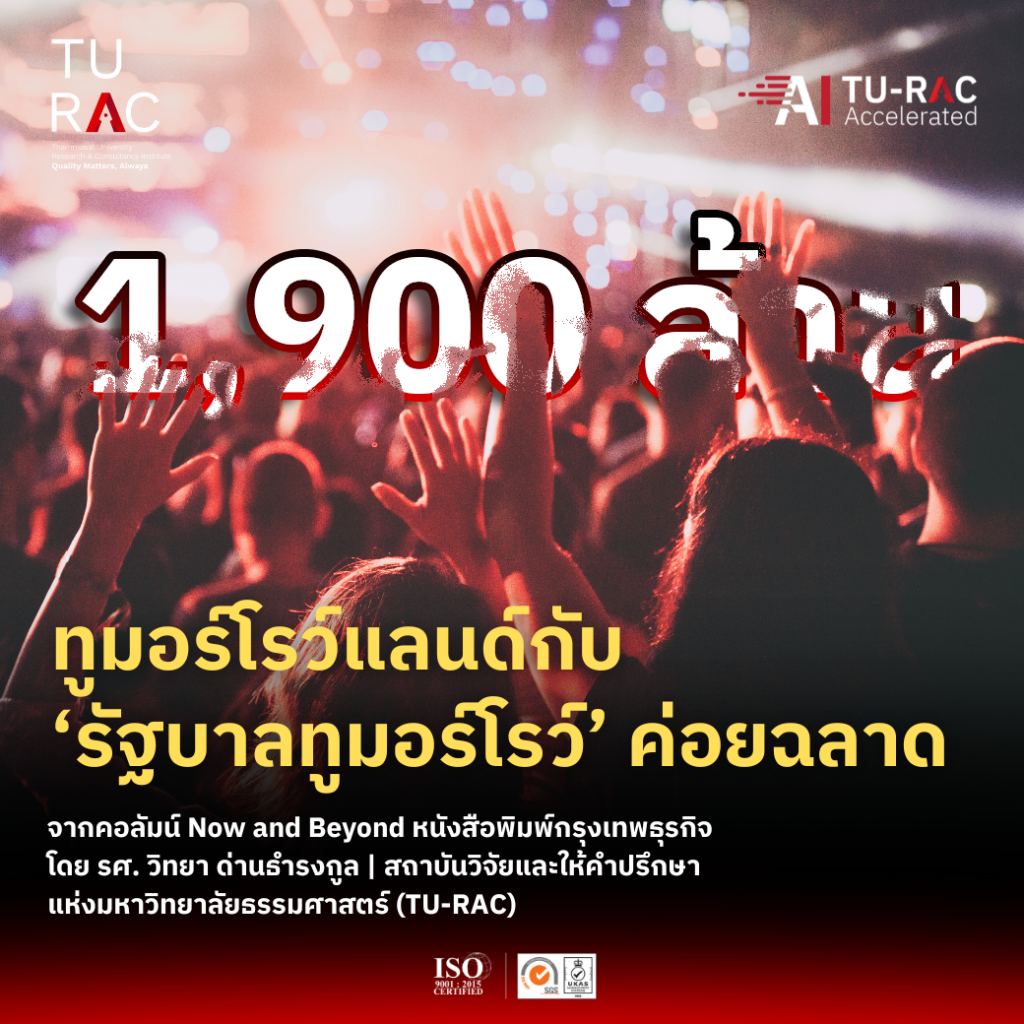TU-RAC ชวนอ่านบทความจากกรุงเทพธุรกิจ ในคอลัมน์ Now and Beyond by TU-RAC ทุกวันพฤหัสบดี ในหนังสือพิมพ์กรุงเทพธุรกิจ และกรุงเทพธุรกิจออนไลน์ เรื่อง ทูมอร์โรว์แลนด์กับ ‘รัฐบาลทูมอร์โรว์’ ค่อยฉลาด โดย รศ.วิทยา ด่านธำรงกูล สถาบันวิจัยและให้คำปรึกษาแห่งมหาวิทยาลัยธรรมศาสตร์ (TU-RAC) . รัฐบาลประกาศนำ “Tomorrowland” เทศกาลดนตรีระดับโลกมาจัดในไทย 5 ปี ด้วยงบกว่า 1,900 ล้านบาท โดยให้เหตุผลว่าเป็นการสร้างซอฟต์พาวเวอร์ แต่คำถามคือ ผลลัพธ์จะคุ้มค่ากับการลงทุนจริงหรือไม่ หรือเป็นเพียงการสร้างภาพทางการเมืองชั่วคราว กระบวนการศึกษาความเป็นไปได้ใช้เวลาเพียงเดือนเดียวก่อนผ่านอนุมัติ ทำให้หลายฝ่ายสงสัยว่าผลลัพธ์ถูกกำหนดไว้ล่วงหน้าแล้ว ขณะที่รัฐบาลยังเน้น “จำนวน” นักท่องเที่ยว มากกว่าคุณภาพ ทั้งที่สิ่งที่ประเทศต้องการคือผู้มาเยือนที่ใช้จ่ายยั่งยืน ไม่ใช่แค่สนุกแล้วจากไป ขณะเดียวกัน สถิติยังบ่งชี้ว่านักท่องเที่ยวครึ่งปีที่ผ่านมาลดลง 6% ซึ่งสะท้อนปัญหาโครงสร้างที่ยังไม่ได้รับการแก้ไข ที่ผ่านมาโครงการใช้งบด้านการท่องเที่ยวหลายครั้งก็ไม่แสดงผลลัพธ์ชัดเจน เช่น สงกรานต์สนามหลวงกว่า 200 ล้านบาท หรือโครงการ Splash กว่า 55 ล้านบาท Tomorrowland จึงเสี่ยงเป็นเพียง “งานโชว์” ที่ใช้เงินก้อนใหญ่โดยไม่สร้างมูลค่าถาวร สรุปคือรัฐบาลกำลังผลักดันซอฟต์พาวเวอร์แบบฉาบฉวย ในขณะที่ปัญหาเศรษฐกิจจริงกลับถูกละเลย สุดท้าย Tomorrowland อาจเป็นเพียง “เทศกาลของคนอื่น” ที่ผ่านมาแล้วผ่านไป เหลือเพียงคำถามว่า เมื่อไหร่รัฐบาลไทยจะฉลาดขึ้นจริง ๆ
รายละเอียดเพิ่มเติม : https://www.bangkokbiznews.com/lifestyle/travel/1194043
Is it really worth it? 1.9 billion baht for “Tomorrowland”?
.
TU-RAC invites you to read an article from Bangkok Biz News in the column Now and Beyond by TU-RAC, published every Thursday in the newspaper and online.
This week’s article is “Tomorrowland and the ‘Tomorrow’ Government That Slowly Gets Smarter” by Assoc. Prof. Witaya Danthamrongkul, Thammasat University Research and Consulting Institute (TU-RAC).
The government has announced that it will bring Tomorrowland, the world-renowned electronic music festival, to Thailand for five years with a budget of over 1.9 billion baht, claiming it to be a move to build national soft power. But the real question is: will the outcome justify the investment—or is this merely political showmanship?
The feasibility study was completed in just one month before approval was granted, raising doubts that the outcome had already been predetermined. Moreover, the government continues to emphasize the number of tourists rather than their quality, even though what Thailand truly needs are high-value visitors who spend sustainably, not those who come for a fleeting thrill and leave. Statistics further reveal that in the first half of this year, tourist arrivals fell by 6% compared to last year, highlighting deeper structural issues that remain unaddressed.
Past tourism projects that consumed massive budgets have also shown little in the way of clear results—such as the 200-million-baht Songkran event at Sanam Luang or the 55-million-baht “Splash” project. Tomorrowland, too, risks becoming just another flashy event that burns through taxpayer money without leaving lasting value.
In short, the government seems to be pushing a superficial version of soft power while neglecting real economic challenges. In the end, Tomorrowland may turn out to be merely “someone else’s festival” that comes and goes—leaving behind only the lingering question: when will Thailand’s government truly get smarter?
Read more: https://www.bangkokbiznews.com/lifestyle/travel/1194043



